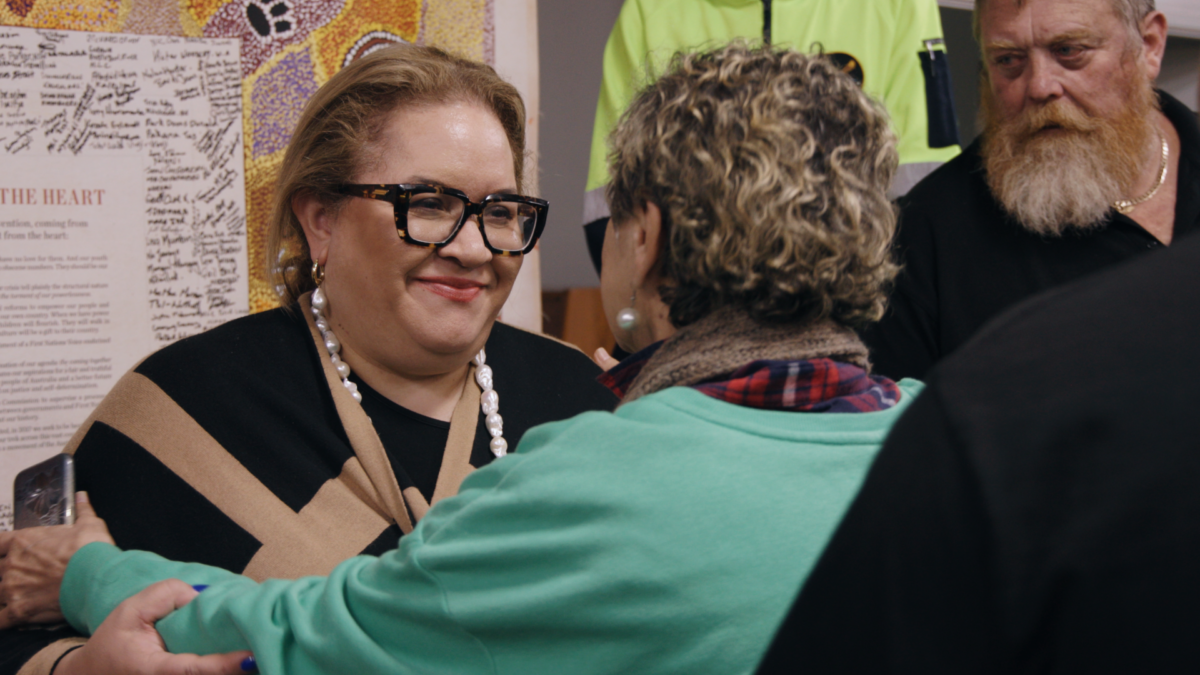PROFESSOR MEGAN DAVIS EXPLAINS WHY ULURU STATEMENT WAS ISSUED TO AUSSIES AND NOT POLITICIANS


The local community information session held at Bethania in southeast Queensland proved a popular homecoming for local girl Professor Megan Davis. (Image credit: The Uluru Dialogue)
A Co-Chair of the Aboriginal-led “Yes” campaign, the Uluru Dialogues, has used a community town hall event in southeast Queensland to explain a little-known but critically important aspect of the Indigenous Constitutional recognition process.
Uluru Dialogue Co-Chairs Professor Megan Davis and Pat Anderson AO addressed local community members at Bethania in Brisbane about the upcoming referendum on the Voice to parliament and of the importance of Australia to be voting “Yes”.
Earlier on Friday, “Mob23”, a conglomerate of southeast Queensland-based grassroots Indigenous organisations - of which The Uluru Dialogue is a part – also staged a small and intimate “yarning circle” at West End Croquet Club in South Brisbane.

The Uluru Dialogue's referendum community information sessions have been attracting big audiences of locals who are keen to find out the facts about the Voice, and Bethania was no exception. (Image credit: The Uluru Dialogue)
The community hall event at Bethania was a significant homecoming for Professor Davis, who attended primary and high school in the area and undertook her university studies at St Lucia before spending the next two decades working on constitutional recognition. Her appearance at the packed community hall was in front of many of her life-long connections including former tutors, schoolmates and family friends.
Professor Davis during her address spoke of why the Uluru Statement from the Heart was issued to the Australian people back in 2017 and not to politicians, and of the fact very few Australians know about the special, heartfelt invitation which was presented to them.
“During the 12 regional dialogues which we ran across 2016-17, we found that on the first day of each dialogue, it was best to allow extra time for people to air their disappointment and anger and feelings of powerlessness, as well as the stories they told of their own country, and what they've been through,” Professor Davis said at Bethania.
“For example, during the protection era, many of the dialogue people had grown up on reserves and missions. And there was a really sad, but earnest lament from them that Australians didn't want to know what First Nations people had experienced during their lifetime on their own country. We heard some really difficult stories about what had happened to people.
“And then despite all of the stories about compulsory racial segregation and protection, about childhood removals, about stolen wages and stolen children, despite all of that on the first day, the dialogue participants said to us, ‘We would like to issue this statement to the Australian people, as an expression of love.’ That's what the ‘heart’ is - a sign of friendship, an olive branch.
“Our people are generous people and they want the country to move forward together in unity. I was completely blown away by this gesture.
“We’d invited the Prime Minister and the opposition leader to accept the Uluru Statement as a bark painting, like the politicians always have. But our old people out at Uluru said, ‘No, they're going to take it and put it on the wall in Parliament House and they're not going to implement what's in there. We have to go out on the red dirt, stare down the camera and invite Australians to walk with us, like they did in 1967, in a movement of the Australian people for a better future.
“Even after all that had come before, our First Nations people spoke of love. That is one of the things people never hear about the Uluru Statement. And embedded in the Uluru Statement from the Heart is that having an enhanced role in participating in the democratic life of the Australian state was the form of recognition they wanted.
“They want to be at the table when laws and policies are made about our communities. That is what this reform is about.”
So far the Uluru Dialogue team has held similar information sessions across large parts of Queensland as well as throughout regional New South Wales, with more planned, including for South Australia.
